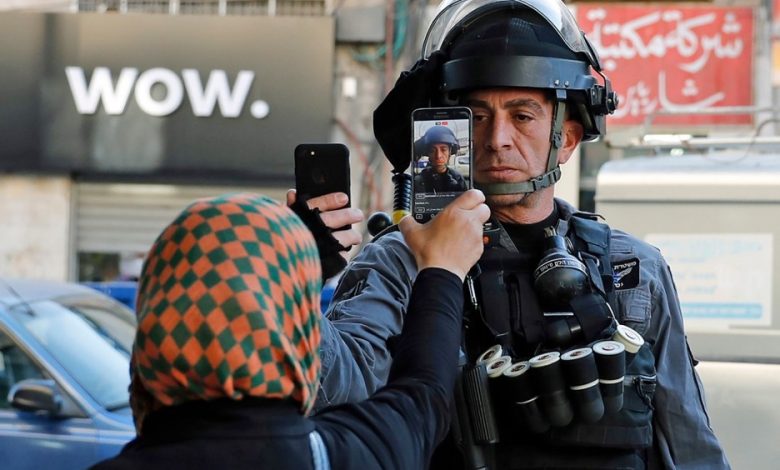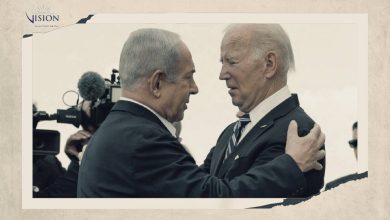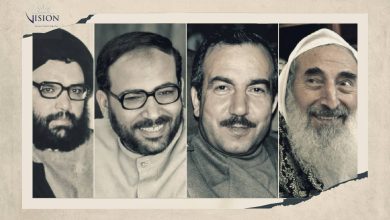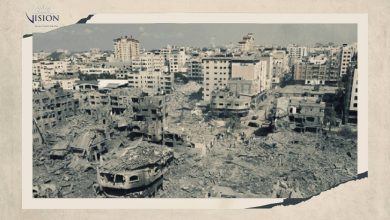How to End Israel’s Digital Occupation
Silicon Valley executives should recognize Palestinian statehood in line with U.N. norms

Emerson T. Brooking
The 4.8 million residents of the occupied Palestinian territories live in two simultaneous and vastly different realities. In the physical world, Palestinians are captives, crammed into Gaza or West Bank enclaves and blockaded by Israeli military checkpoints. They are subject either to the rule of Hamas, a U.S.-designated terrorist organization, or the Palestinian Authority (PA), a government that has ruled—unelected—for 12 years and maintains its hold on power by intimidating democratic activists. In both cases, Palestinians are ultimately answerable to Israeli military courts, which deny defendants access to legal counsel during interrogation and have a conviction rate of nearly 100 percent.
But on the internet, the checkpoints disappear. Palestinians can converse with family from whom they are separated by barbed wire and machine gun emplacements. They can share their stories with observers and sympathizers around the world. In doing so, Palestinians can call themselves citizens of a sovereign State of Palestine: one recognized by 138 countries and admitted in 2012 as a non-member observer state to the United Nations. This second, digital Palestine represents a fulfilment of the internet’s optimistic and largely forgotten promise to give voice to the voiceless and illuminate the darkest corners of the world.
It is also under threat of being extinguished. This is due to a confluence of three forces. The first is the expansive police and surveillance apparatus of the State of Israel, which is used to track, intimidate, and imprison Palestinians in the occupied territories for their online speech. The second is a network of formal and informal institutions used by the Israeli government to target pro-Palestinian expression across the globe. The third—and most surprising—force is that of American social media companies, which have shown a willingness to silence Palestinian voices if it means avoiding potential political controversy and pressure from the Israeli government.
Together, these forces demonstrate how it is possible for an ostensibly democratic government to suppress a popular online movement with the acquiescence of ostensibly liberal Silicon Valley executives. The playbook being pioneered against Palestinians will not stay in the Middle East forever. In time, it may be deployed against activist communities around the world.
Palestinians were early and enthusiastic adopters of the internet. Although less than 2 percent of Palestinians had internet access in 2001, that figure had risen to 41 percent by 2011, making them among the most connected people in the Middle East. They managed this despite the severe import controls and periodic blockades that defined daily life, as well as Israel’s near-total control of the physical backbone of the Palestinian internet. For young Palestinians, social media offered a way to engage with a cultural identity and shared history that had been fractured before they were born. It also enabled them to organize protests against the Israeli occupation and to cast light on the damage inflicted by Israeli bullets and bombs.
As Palestinians found their digital voice through the mid-2000s, the Israeli government worried increasingly about its own. The Israeli Defense Forces (IDF) invested heavily in its online influence capabilities, recruiting bloggers and graphic designers and establishing a strong presence on Facebook, Twitter, and YouTube. During times of conflict, Israeli college students organized hasbararooms, where they gathered to produce pro-Israel content and push back against the perceived anti-Israel bias of the international media. (Hasbara means “explaining” in Hebrew.)
Yet it was not enough to shift global public opinion, which remained sharply critical of Israel during its 2012 and 2014 wars in Gaza. The newly introduced Iron Dome missile defense system left these conflicts with widely disparate civilian death tolls: Nine Israeli civilians were killed in the fighting, compared to somewhere between 800 (according to the IDF) and 1,800 (according to Hamas) Palestinians, many of them children. Social media was flooded with visceral proof of Palestinian suffering.
In 2015, the online component of the Israeli-Palestinian conflict took on a terrible new dimension. Young Palestinians, radicalized by the propaganda of Hamas and other Islamist organizations as well as viral videos of those killed or victimized by the Israeli occupation, embarked on a spontaneous and largely leaderless terror campaign. The resulting “stabbing intifada” saw more than 300 attempted stabbings, shootings, and ramming attacks in Israel and Palestine over the course of a year, resulting in the deaths of 34 civilians, 31 of them Israeli and three of them foreign nationals, as well as five Israeli security personnel. Israeli military and police responded by killing more than 150 suspected Palestinian attackers alongside scores of rioters and protesters.
Israeli security forces then turned their attention to social media, creating networks of fake Facebook accounts to facilitate surveillance and arresting more than 300 Palestinians for Facebook activity they claimed demonstrated “incitement to violence and terrorism.” In 2016, Israel passed a strict new counterterrorism law that broadened the definition of incitement to include any demonstration of “solidarity” with terrorism or terrorist organizations. Because of the law’s expansive powers to define these terrorist organizations, it effectively criminalized the public praise, support, or even display of flags associated with Palestinian solidarity or independence movements. The law also empowered the Israeli military to arrest Palestinians for the content they shared online—even in Areas A and B of the West Bank, governed under the Oslo Accords by the PA.
When the violence of the “stabbing intifada” subsided, the arrests did not. According to figures compiled by 7amleh, a Palestinian digital rights organization, roughly 2,000 Palestinians have been arrested by Israeli security officials for social media posts since 2017. Israeli authorities say that these arrests are the result of AI-assisted predictive policing, which uses demographic and psychological profiling to detain suspects who may one day commit acts of violence. They insist the technology has prevented hundreds of terrorist attacks, but it is impossible to verify such claims. Because of the terrible, zero-sum logic of the occupation—which pits the safety of Israeli citizens against the rights of hostile, noncitizen Palestinians—Israeli security officials remain incentivized to track and detain as many people as possible.
This cycle of surveillance, interrogation, and imprisonment has an obvious chilling effect on digital expression. Palestinians cannot know when a call to national solidarity might be labeled by Israeli predictive algorithms as incitement. They cannot know if a Facebook “like” directed at any number of Palestinian political bodies may be construed as support for terrorism or when a new group may be declared a terrorist entity. (In October, the Israeli government applied the “terrorist” label to six large Palestinian human rights organizations, abruptly threatening thousands of aid workers and recipients with legal jeopardy.) Palestinians only know that, if the arrests come, they will be separated from their families and sent to prison for months or years.
Israel’s efforts to proscribe pro-Palestinian speech range far beyond the Middle East. In recent years, the Israeli government and government-adjacent organizations have placed immense pressure on Facebook (whose corporate parent is now known as Meta) and other technology companies to adopt a new and expansive definition of antisemitism. This definition, published by the International Holocaust Remembrance Alliance (IHRA) in 2016, associates criticisms of Israel with anti-Jewish hate speech, including attacks on the nation’s right to “self-determination” and any attempt to hold the Israeli government to “double standards.” If adopted by social media platforms, such a broad definition would severely restrict online criticism of Israeli government policy.
The IHRA definition has prompted fierce debate within the Jewish community. It is clear that technology companies have not done enough to curtail Holocaust denialism and anti-Jewish bigotry, evidenced by the sharp rise in antisemitic violence and terrorism in recent years. At the same time, however, some Jews have pushed back against the movement to inextricably link Zionism—the late 19th-century Jewish nationalist movement that is Israel’s founding ideology—with Judaism as a whole. In June, more than 200 Jewish scholars issued the Jerusalem Declaration on Antisemitism, intended to refine the IHRA definition by distinguishing criticisms of Israel and Zionism from attacks on the Jewish people. It is critical, they wrote, to fight antisemitism while ensuring “an open debate about the vexed question of the future” of Israel and Palestine.
For Palestinians, the outcome of this debate holds potentially grave consequences. Widespread adoption of the IHRA definition would hamper discussion of Palestinian history, which is rooted in the forced expulsion of more than 700,000 Palestinians from their homes at the hands of Zionist guerrillas in the late 1940s, as well as much of modern Palestinian culture, linked as it is to the privations of the 53-year Israeli military occupation of the West Bank and Gaza Strip. By outlawing some criticisms of Israel, it would necessarily reduce the space in which one could express support for Palestinian self-determination.
Just as the Israeli government seeks to rewrite social media speech codes, it has also created new institutions to police the platforms directly. Since 2015, the Israeli Justice Ministry has operated a Cyber Unit that has issued tens of thousands of content removal requests to Facebook, Twitter, and YouTube, mostly alleging violent incitement or support for terrorism. Technically, these requests are voluntary. They are not legally binding and are therefore not tracked in the transparency reports that technology companies use to disclose formal government censorship orders. Nonetheless, social media companies have complied with the Cyber Unit’s requests roughly 90 percent of the time.
In practice, Israel’s Cyber Unit wields an astonishing amount of power. Although it speaks with the force of the Israeli government, it remains unbound by Israeli constitutional laws that guarantee freedom of expression and due process. It can target the speech of any internet user—that of an Israeli citizen, a Palestinian resident, or a neutral third party anywhere in the world—and launch a suppression campaign that remains effectively invisible to the outside observers. In April, the Israeli High Court of Justice ruled that the Cyber Unit’s practices did not violate Israeli law, citing executive privilege and the “voluntary” nature of these requests. This decision has paved the way for future expansion of such clandestine censorship efforts.
As Palestinians have embraced and relied upon digital activism to further their cause—and the Israeli government has come to see it as a security threat—social media companies have largely failed at charting a middle course. The Israeli government exerts a coordinated legal and extralegal pressure campaign that technology executives simply cannot ignore.
By contrast, the fragmented nature of Palestinian sovereignty—torn between Hamas and the PA, and under military occupation at that—means that Palestinians lack an effective form of redress. They cannot issue subpoenas or police orders to social media platforms, nor can they threaten new laws and regulations. No matter how persuasively Palestinians might argue for their right to free speech, the deck is stacked against them. For example, Facebook’s senior leadership has engaged in consultative sessions with Israeli security officials since at least 2016. The first high-profile meeting with the PA came only in 2021 after a prolonged lobbying campaign. Israel’s native technology sector also gives it an undeniable edge when it comes to such soft power. Facebook’s Tel Aviv branch is an enormous regional hub and one of only two corporate offices in the Middle East.
The result is systemic anti-Palestinian bias in the content moderation practices of social media companies. This bias was evident in May when Palestinians rallied against planned Israeli land seizures in occupied East Jerusalem. Over a month of escalating street protests and police reprisals, 7amleh documented nearly 700 instances of pro-Palestinian content that had been deleted, downranked, or otherwise hidden from view, often without warning or adequate explanation across Facebook, Instagram, Twitter, YouTube, and TikTok. For those Palestinian activists who relied on their online visibility to safeguard their own physical security, these removals were especially alarming. “So much of our strength … comes from our ability to be heard,” reflected Mariam Barghouti, a Palestinian policy analyst, in a June piece she authored for Rest of World. “I felt we were being attacked from all sides and denied the permission to even testify to our own reality.”
As the May crisis intensified—indiscriminate barrages of Hamas rockets that killed 14 Israeli civilians, answered by IDF air strikes and police actions that killed an estimated 156 Palestinians—this digital divide became starker. Any Arabic-language content shared by a Palestinian was seen as a potential act of terrorism. According to monitoring by Human Rights Watch, one Instagram user who shared a series of New York Times headlines about Israeli air strikes and land seizures saw their post removed for urging their followers to “never concede” their rights under international law. Another Instagram user’s content was removed for sharing a photograph of damage wrought by Israeli bombs in Gaza (Caption: “This is a photo of my family’s building before it was struck by Israeli missiles … We have three apartments in this building.”) At the same time, anti-Palestinian hate speech—written in Hebrew rather than Arabic—remained readily visible across social media.
Some groups within larger social media companies have awoken to the ongoing erosion of Palestinian digital rights. In September, the Facebook Oversight Board called for an independent investigation of Facebook’s content moderation practices toward pro-Palestinian content to determine if they had been “applied without bias.” (Facebook has since committed to doing so.) The Oversight Board also voiced concern that government organizations like Israel’s Cyber Unit may have invisibly shaped Facebook’s content moderation decisions. Should Facebook take these nonbinding concerns and recommendations seriously, other social media companies may follow suit in reevaluating their approach to Palestinian speech.
Yet it should be said: This is still very weak tea. The sympathies of a corporate oversight board offer limited comfort to Palestinians who are the targets of Israel’s sophisticated surveillance and censorship apparatus. A stronger and more immediate step would be for social media companies to commit to observing U.N. General Assembly Resolution 67/19, passed in 2012, which recognizes a distinct State of Palestine and grants it standing as a non-member observer state within the United Nations. The Vatican, whose quasi-national status social media companies do appear to recognize, operates under a similar such U.N. resolution.
Such an action would formalize a kind of Palestinian digital sovereignty, guaranteeing Palestinians limited rights of online expression and due process beyond the mediation of Israeli security officials. It would embody the spirit of both the Oslo Accords and subsequent U.S.-brokered peace initiatives, which have each sought to chart a roadmap toward a future Palestinian state. It would also echo the democratic principles long espoused by social media companies and exemplified by Facebook’s recent Corporate Human Rights Policy, which saw the company endorse a series of international treaties and human rights norms. (Facebook declined a request from Foreign Policy to share its current position on the recognition of Palestinian statehood.)
More practically, social media companies’ recognition of a digital State of Palestine would strengthen protections for Palestinian speech. The Israeli government would no longer be able to issue content removal requests that treat Palestinians as a restive, stateless minority. Technology executives would no longer so comfortably coordinate regular meetings with Israeli security officials while ignoring Palestinian representatives. In future crises, Palestinians could rest a little easier knowing that their digital voices—the key to their safety and their only effective means of redress—would not lay entirely at the mercy of a hostile foreign power. As Israel continues to view Palestinian expression as a national security threat and to apply the label of “terrorism” ever more indiscriminately, the need for this protection will only grow.
Of course, no policy is a panacea. If the PA alone received the benefits of digital statehood, it might use such enhanced standing to intensify its own censorship of democratic activists and political rivals. Three-fourths of Palestinians are too young to have voted in the last free Palestinian election in 2006. Though Palestinians may have an internationally recognized claim to independence, they lack a truly representative government. Therefore, the protections of digital sovereignty should rest foremost with the Palestinian people themselves to shield their political speech and to grant them basic due process as they find themselves beset by forces that would take these things away.
Unless drastic action is taken, the outlook is grim. It has long been a truism that the internet is the ally of activists and underdogs—that, in the words of activist John Gilmore, it “interprets censorship as damage and routes around it.” For the cause of Palestinian self-determination, the reverse now appears to be true. The Israeli government has established a remarkably effective series of systems to suppress Palestinian speech. Technology companies, seeking to reduce legal and political risk, have done the rest. The result is that, even as morePalestinians than ever connect to the internet, their digital spaces have never been so small.
This article has been originally published by the Foreign Policy





